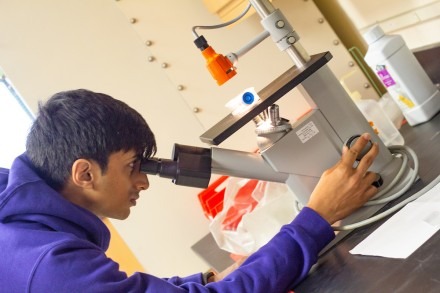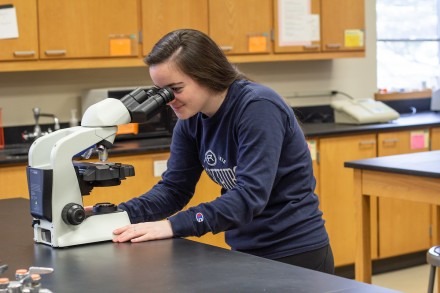Rockhurst University is home to one of the highest-quality medical laboratory science programs in Missouri. We offer a Bachelor of Science degree in medical laboratory sciences in cooperation with Saint Luke’s Hospital, North Kansas City Hospital, and University Health.


Program Overview
A medical laboratory sciences degree from Rockhurst University lands graduates in satisfying careers in laboratories across Missouri and the U.S.
Analyzing blood, urine, tissue and body samples, students in a medical laboratory sciences program play an essential part in the detection, diagnosis and treatment of illness and disease.
Students may elect one of two routes of entry into the program. Students who are seeking a baccalaureate degree in medical laboratory sciences from Rockhurst University must complete 98 semester hours and all non-clinical degree requirements before beginning the professional component at a hospital site. This professional component lasts approximately one calendar year.
Learning Outcomes
- Upon successful completion of the medical laboratory sciences courses, the student is awarded a Bachelor of Science degree in medical laboratory sciences.
- Students may alternatively choose to complete a degree with a major in chemistry, biology or another related area, including the specific required courses for medical laboratory sciences admission, and then apply directly to one of the affiliated hospitals for admission to medical laboratory sciences as a non-degree student.
Careers in Science
What is a medical laboratory scientist?
Formerly known as “medical technology,” medical laboratory sciences are a field of study revolving around biology and chemistry. Graduates of the program are eligible to take either of two nationally recognized certification examinations to become a medical laboratory scientist or medical technologist.
Medical laboratory scientist jobs
Rockhurst program graduates can enjoy a career that is in rapidly growing demand, with opportunities for quick career advancement within the field. A medical laboratory scientist's annual salary averages between $55,000 and $61,000.
Medical Laboratory Scientist
Medical Laboratory Technician
Physician
Cytotechnologist
Medical Technologist
Clinical Pathologist
Microbiologist
Medical Technologist
Course Map
Degree and class descriptions and requirements can be found by clicking on the course catalog listing below:
Popular Courses
Isolation and identification of microorganisms, including bacteria, viruses, rickettsiae, parasites, and fungi that cause disease; clinical interpretation of tests and correlation of results with patient condition.
Analysis of the relationships between donor blood components and blood recipients; introduction to all red blood cell antigen systems; antigen and antibody detection; prevention of transfusion incompatibilities; assessment of patient transfusion-related occurrences.
Immunofluorescence, enzyme immunoassay, molecular diagnostics, flow cytometry, radioimmunoassay and other immunochemistry, using sophisticated instrumentation with current computer hardware and software.
Clinical workshops on a variety of topics including general laboratory skills, research and development, phlebotomy, parasitology, and mycology.
Degree Info
- Upper-level professional courses are taken at one of the affiliated hospitals.
Find Your Program
Choose topic to quickly find specific program details
